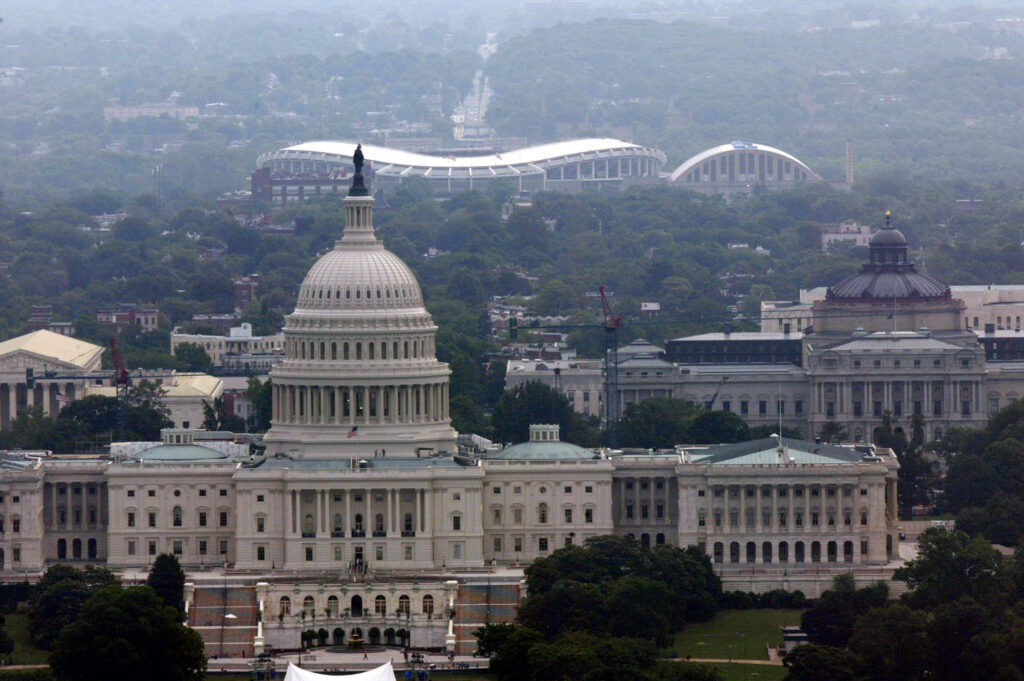The recently reconvened House of Representatives is wasting little time resuming efforts to impose sweeping federal control over D.C. residents, with Republicans turning their attention once again to public safety in the nation’s capital.
Before the government shutdown, federal lawmakers unleashed a wave of bills aimed at overhauling D.C.’s criminal justice system in line with President Donald Trump’s demands. They’re picking up the effort Wednesday, despite outcry from local elected officials and concerns about the effectiveness of their proposed changes.
House lawmakers plan to vote on two D.C.-specific bills: One would repeal local police reform legislation passed in the wake of the killing of George Floyd; another would drastically reconfigure the city’s bail system.
In August, Trump declared a local crime emergency in D.C., temporarily seizing control of the local police department and flooding city streets with federal agents and the National Guard. Three months later, with local elected officials largely helpless to stave off federal intervention, camouflage-clad troops remain on patrol and the mayor appears unable to extricate local police from working alongside immigration authorities as part of Trump’s aggressive deportation agenda.
As crime rates that were falling before the takeover continue to decline in the city, congressional intervention has received some bipartisan support, especially when it comes to crime and policing: Three of four bills targeting aspects of D.C.’s criminal justice system that have already passed the House in recent months did so with Democratic votes.
“We urge members of Congress to reject this unprecedented federal overreach and vote against these bills,” D.C.’s top three elected officials — the mayor, the council chairman and the attorney general — said in a joint statement this week.
The Constitution gives Congress, in which D.C. has no voting representation, authority over D.C.’s laws and budget.
“We’re doing our jobs and I make no apologies for that whatsoever,” Rep. Virginia Foxx (R-North Carolina) said recently in support of the legislative steps, appearing open to stripping D.C. of its already limited self-governance altogether. “I would not mind looking at the whole Home Rule issue and giving back to Congress the complete jurisdiction.”
The bills would face more challenges in the Senate, where Democratic support is needed to overcome the filibuster.
The legislative push is an effort to strip local leaders of power under the guise of tackling crime, said Ankit Jain, a shadow senator for D.C.
“This is about using Washington, D.C. as a test case to advance the far-right, MAGA agenda for blue cities across the country,” he said at a Tuesday afternoon news conference, steps from the Capitol and flanked by a couple dozen people waving red signs proclaiming, “FREE DC.”
Among those missing from the event: Eleanor Holmes Norton, D.C.’s longtime nonvoting delegate in the House. A once formidable advocate, she is now the subject of mounting scrutiny about her ability to adequately represent D.C. A spokesperson for Norton said she was “unable to attend,” and did not respond to a follow-up question asking why.
Policing bill repeal
Republicans have tried repeatedly to repeal D.C.’s major police reform package, which, among many things, placed restrictions on various policing tactics such as neck restraints and police pursuits, enhanced public access to police disciplinary records and prohibited the police union from bargaining on discipline. They nearly succeeded in blocking the policing legislation in 2023, with support from Democrats in both chambers. But President Joe Biden vetoed the effort.
With Republicans now in control of both chambers and the White House, the policing legislation may be in jeopardy once again should the Senate take it up, especially given a group of moderate Democrats are already on record backing the repeal push.
The chances of the other criminal justice bills succeeding in the Senate are up in the air. While D.C. officials used to consider congressional Democrats to be reliable allies, that trust frayed in 2023, as more and more moderate Democrats began joining Republicans to swat down liberal D.C. policies.
Bail system overhaul
The proposal would require any person charged with a violent or dangerous offense — which includes some drug offenses and nonviolent felonies — be detained before trial.
Under D.C.’s existing system, a judge’s decision on whether someone should be released is based entirely on their risk of flight or danger to the community. The legislation would return cash bail to D.C. for certain offenses, reviving a system not used in D.C. for more than 30 years. Offenses subject to cash bail would include destruction of property, rioting and unarmed burglary or robbery, among several others — or any previous conviction for one of those crimes.
Local and national criminal justice researchers and advocates have largely pointed to D.C.’s current system as a model. D.C. became one of the first jurisdictions nationally to do away with money bail in 1992, mirroring changes in the federal criminal justice system. Since then, crime has fallen and risen at various points in the District, without evidence that those crime trends have had any ties to D.C.’s bail system.
It is rare for a person to commit a violent offense while out on bail, according to data from the federal Pretrial Services Agency, which supervises defendants out on bond and makes recommendations to D.C. judges about who should be released or detained. Of the nearly 16,000 people released pending trial from October 2024 to January 2025, just 1.2 percent were rearrested for a violent crime. Roughly 90 percent remained entirely arrest-free, and about the same amount made all court appearances.
Ariel Levinson-Waldman, founding president of Tzedek DC, a public interest group in D.C. aiding people crippled by debt, called the legislation a “dangerous proposal.” He said it would unfairly punish poor people who may not pose a public safety risk to the community by subjecting them to the destabilizing effects of incarceration while presumed innocent, such as losing their jobs, livelihoods or custody of their children — consequences the organization outlined in a report this week.
The post Taking Trump’s lead, House Republicans eye changes to D.C. bail, policing
appeared first on Washington Post.




